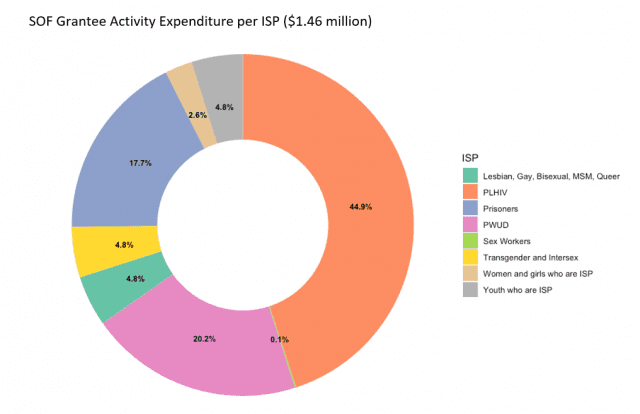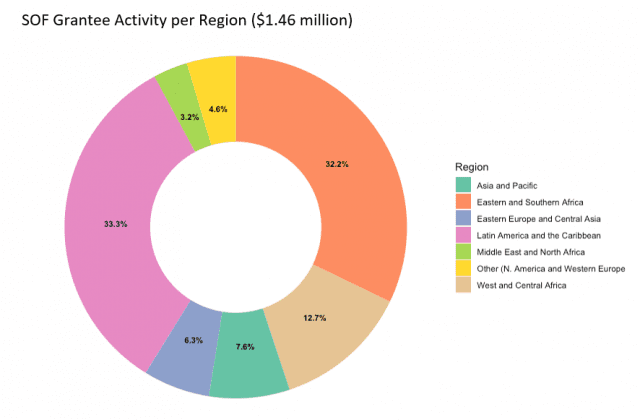Strategic Opportunity Fund Report
Strategic Opportunity Fund Report
Robert Carr Fund initiated the Strategic Opportunity Fund (SOF) to encourage networks and consortia to think creatively about how they improve the health, wellbeing and social inclusion of inadequately served populations (ISPs).
Offering the opportunity to address the strategic challenges arising from their difficult environments, SOF activities built on prior core funding provided by RCF. While the SOF originally intended to support “new approaches to advance health”, in practice the funding helped to better align their work with activities that grantees have planned or developed for years but – because they were not prioritized by other funders – have lacked support to implement.
The SOF focused on three key areas:
- movement leadership;
- financial health and resilience of ISP programs;
- innovation, learning and partnership.
To read more about the Strategic Opportunity Fund, follow the link.

Five grants were awarded to two consortia (Positive Universe, led by the Global Network of PLHIV and the Harm Reduction Consortium, led by the International Drug Policy Consortium) and three regional networks (Caribbean Vulnerable Communities Coalition, Inclusive and Affirming Ministries and the South African Network of Prisons). SOF grantees were all current or former core grantees of RCF.

The report shows how grantees valued RCF’s flexible approach, and particularly the encouragement to experiment and take risks.
The SOF awarded $500,000 to five grantees over 18 months (1 July 2020 to 31 December 2021), in addition to core funding from RCF. Most of the funds (nearly 60%) were spent on project activities.
1. Building Social Enterprises – Caribbean Vulnerable Communities Coalition (CVC)
CVC used its SOF grant to expand its existing social entrepreneurship work in Dominican Republic to other Caribbean countries. They gave seed funding to train and support 29 community-based organizations (CBOs) in how to establish profit-making enterprises, identifying initially whether they had the skills and resources to take this step. As a result of the SOF, several CBOs secured new private sector partnerships and improved their sustainability through emerging new businesses. Importantly, the grant has also enabled CVC to secure Global Fund support going forward and bolstered its own capacity in social entrepreneurship skills.
2. PLHIV and Universal Healthcare Advocacy – Positive Universe, led by the Global Network of PLHIV (GNP+)
The project set out to support networks of people living with HIV to advocate for universal healthcare (UHC) and health financing by hosting a series of advocacy “bootcamps” in different regions. These included training five networks of PLHIV in West Africa on advocacy strategies to strengthen national UHC policies. In Indonesia, organizations in eight cities and six provinces were trained in UHC advocacy, which led to a multi-sector dialogue bringing activists together with national health policymakers and UNAIDS. To take this work forward, activists have joined new health coalitions, additional funding has been secured from Aidsfonds for a five-year programme – The Love Alliance. GNP+ has also developed a tool on how to use national stigma index data for UHC advocacy, which was translated into English, French and Russian.
3.Working with Schools – Inclusive and Affirming Ministries (IAM)
IAM wanted to create safer and more inclusive schools by linking schools across Eastern and Southern Africa to sexual and reproductive health (SRH) support services through dialogue and participatory convenings. Working in schools was a new activity for IAM, and they began working with teachers, social workers and some students. For each country LGBTQI+ youth-led steering committees were set up to guide the project. In-country partners were trained by Gender Dynamix in LGBTQI+ issues which enabled them to do intersectional work in schools, addressing issues of race, rurality and discrimination based on sexual orientation. The initiative was particularly well received in South Africa, Ghana, Zimbabwe, Namibia and Botswana. IAM is receiving funding from the Arcus Foundation until 2023 to continue the work started through the SOF and is continuing to apply for further funds.
4. Global Drug Policy Index – Harm Reduction Consortium, led by the International Drug Policy Consortium (IDPC)
The Harm Reduction Consortium had a long-term interest in developing a Global Drug Policy Index (GDPI), a metric for strengthening advocacy towards people who use drugs. The idea was to assess and measure government responses to and spending on PWUDs. Thanks to SOF, the GDPI was developed with academic partners, based on data from 30 countries, and sparked national advocacy by Consortium partners across the world. In 2022 the GDPI won the prestigious Fast Company ‘Design for a Better World’ Award. Based on GDPI’s rigorous methodology, additional research will be rolled out in more countries in the next phase as other funding is secured.
5. Working with Youth in Prisons – South African Network of Prisons (SANOP)
SOF enabled SANOP to work for the first time on youth in prison settings, focusing on two main activities – youth clubs and citizen-led advocacy. Working with prison authorities in Malawi, Eswatine, Zambia and Zimbabwe, they established 14 youth-led clubs within prisons and 14 clubs for those recently released. The clubs offered vocational skills training to provide opportunities to earn an income and positively contribute to society. Through SOF, SANOP developed stronger partnerships with prisons across the region, training prison officials in human rights and engaging young inmates in citizen-led monitoring – to improve their conditions and uphold their rights. SANOP’s citizen-led monitoring approach involves young people in prisons and former people in prisons completing score cards to rate the prison health services through focus groups and feedback sessions. By participating in data gathering the young people learnt to advocate for better access to health services and other policy changes.
The achievements resulting from SOF demonstrate that RCF is an efficient funding mechanism for strategic investment in community-led and civil society networks. While grantees appreciate RCF’s core funding support for providing a solid base and sustainability for their organizations, they particularly welcomed SOF’s flexibility, allowing them to innovate, take risks and develop new ideas using their existing skills and capacities.
Try something new and don’t be afraid that it might not work because that’s okay. It was all about trying something new and not being too risk adverse. Again, that was so refreshing to hear from a donor.” – SOF grantee.
The grantees recognized that Strategic Opportunity Funding also enabled them to build more cohesive partnerships with their networks and concentrate on fewer countries, in more depth.
Overall, SOF-funded activities aligned the work of national and regional networks and consortia with the specific needs of ISPs on the ground, and supported adaptations that suited their local context. This included deepening and expanding their work with ISPs in closed settings such as prisons and schools.
To learn more please read the full text of the Strategic Opportunity Fund Report.